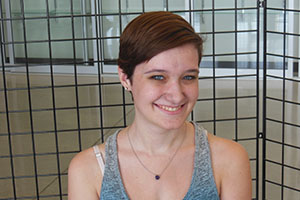Multilingual Timberwolves learned English after their native languages
Until sophomore Eunice Lee was in kindergarten, her only language was Mandarin Chinese. With a Malaysian father and Taiwanese mother, Lee spoke her parents’ native language until being placed in an English for Speakers of Other Languages (ESOL) program at her school.
“Living in a country where everyone speaks a certain language, and you don’t speak that certain language — it’s hard for you to do pretty much anything,” Lee said. “I was in kindergarten, so I think the decision was kind of made for me.”
ESOL, also called English as a Second Language (ESL), refers to the tutoring students receive to speak English at the same level as their native-English-speaking peers. Within the Blue Valley school district, this means being pulled out of a class or classes to work on speaking, writing, hearing and writing English. However, Lee says it was not only the ESOL program that helped her learn the language, but also the total immersion she experienced at school every day.
“I do remember sometimes I would speak in Chinese, and everyone would be so confused, and I’d be like, ‘Oh, wait, I am talking in the wrong language’,” Lee said. “But then in first grade, I spoke English the entire time.”
Senior Jeayoung Jeong, who moved to the United States from South Korea in fifth grade, agrees that immersion made learning English easier.
“[The language] soaked into me,” Jeong said. “If you’re at school for eight hours a day and surrounded by a different language, you pick it up fast enough. I started to understand people a little bit after a few months, but starting in sixth grade I actually talked to people and understood them and read.”
However, the process was not an easy one. While their classmates learned their times tables and state capitals, Jeong and Lee were trying to comprehend a second language.
“I didn’t really have friends because I [couldn’t] communicate with them,” Jeong said. “So all my friends were from ESL. None of us knew English, so we all kind of communicated really awkwardly.”
In addition, both Jeong and Lee said that learning a second language made family life different.
“After a few months, me and my brother were better at English than my parents because little kids could pick it up faster,” Jeong said. Learning a second language, especially at a different pace from each other, caused the whole family stress.
Even now, both Jeong and Lee have families whose members know a variety of levels of multiple languages. Jeong’s family speaks Korean at home, while Lee’s speaks English.
“It’s kind of weird because my youngest brother, he pretty much can’t speak any Chinese — he knows a little bit, but he can’t really communicate in Chinese,” Lee said. “I know my parents want him to be able to speak in Chinese.”
Unlike Lee and Jeong, French teacher Emilie Grant learned English at an older age, after earning a master’s degree from a university in France. She found a job as an au pair (nanny) in California for a year, taking an ESL class at a local community center.
“They had three levels, and I went through all three levels within six months,” Grant said. “So in the end, it was kind of boring — it didn’t feel like I was improving anymore. What really helped was going to a regular university and taking just a regular class that was not ESL — just strictly academic — that targeted English native speakers.”
Grant also said that immersion in daily activities with her host family helped her learn English faster. She then decided to teach high school French.
“I’m really passionate about the French language and the French culture, and I thought it would be nice to be able to share that,” Grant said. “I’m able to give a different perspective than other teachers might give.”
However, there were disadvantages to learning English later in her life. Unlike Jeong and Lee, Grant was an adult when she began to learn English, which made it difficult for her to speak the same way as a native English speaker or someone who had learned as a child. She said she has had people treat her differently because of her French accent, speaking slower or repeating information unnecessarily because they thought she didn’t understand.
“The accent is not a reflection of your intelligence,” Grant said. “The accent is just a reflection of, usually, how old you were when you learned the language and how flexible your vocal cords are.”
But Lee, Jeong and Grant say that learning another language has been beneficial, if not necessary. Speaking English allowed them to communicate at school, work and in public, while speaking their native languages kept them connected to their own heritage. Grant says she encourages native English speakers to learn another language and immerse themselves in another culture.
“I think that if you really want to learn about a culture, you have to speak the language,” Grant said. “There’s no way you can really be familiar and understand a culture if you don’t know the language.”

Madison is a first-year staff writer for the Standard, and spends her work time writing articles or doodling in the margins of her official newspaper notebook....




